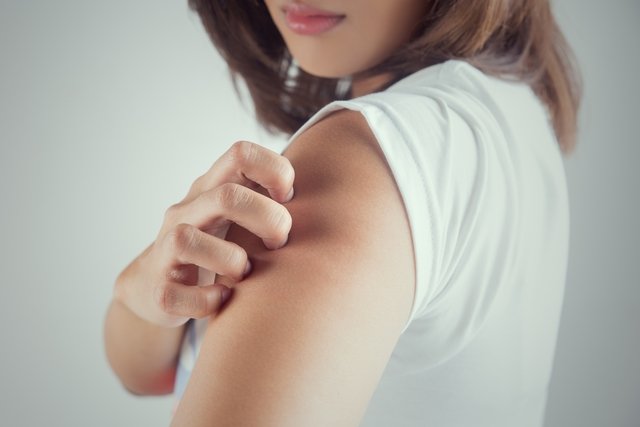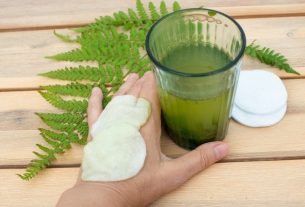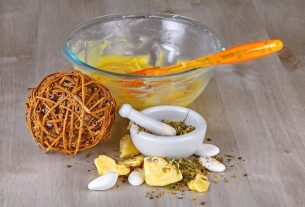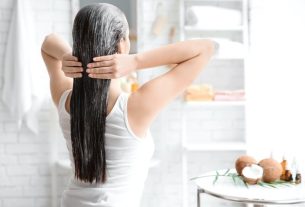Home remedies for itchy skin, such as taking a bath with cold water, applying an ice pack, applying body moisturizer or washing the skin with plantain tea, for example, help to soothe and hydrate the skin, reducing symptoms of itching and redness. , irritation or swelling.
Itchy skin is a symptom that can be related to different situations, such as insect bites, allergies or dry skin, for example, and to alleviate the itching, it is also important to find out what its cause is. Discover the main causes of itchy skin.
If the itching persists even after using these home remedies, it is recommended to see a general practitioner or dermatologist. See the video below for situations that can cause itchy skin:
Some home remedy options for each type of itchy skin are:
1. Insect bite
After being bitten by an insect, such as a mosquito or a flea, for example, the skin may become a little swollen, red and intensely itchy. In this case what you can do is:
- Wash the area with cold water and liquid soap and then dry;
- Apply a piece of ice to anesthetize and de-swell the area, relieving the itching immediately;
- Place 1 or 2 drops of propolis in the exact location of the bite, to heal faster and help relieve itching;
- Mix a teaspoon of cosmetic clay with enough water to make a paste and add three drops of peppermint essential oil and apply the mixture to the bite.
It is not recommended to wash the bitten area with warm water, as this can intensify the itching and inflammation of the skin.
2. Allergy
Skin allergy is an inflammatory reaction of the body that can arise due to the use of medications, food intake, use of cleaning products or use of clothing and some types of fabric, such as wool or jeans, for example. To alleviate this type of itching, it is recommended:
- Apply a cold compress to the area, with a thermal bag or gel bag for 15 to 20 minutes;
- Apply, with the help of gauze, aloe vera gel to the itchy area, repeating this procedure up to 3 times a day;
- Dilute ⅓ cup of oat flour in a bowl with 1 liter of warm water, mixing well for 15 minutes or until the flour dissolves well. After bathing, rinse your body with water and oatmeal. Then, rinse your body with cold water and dry, without rubbing your body.
Additionally, other home remedies that can also help relieve itching, irritation, and redness caused by allergies include peppermint oil and chamomile compresses. Discover other home remedies for skin allergies.
However, in cases of severe skin allergy symptoms, such as swelling in the mouth, tongue or throat and difficulty breathing, it is important to seek the nearest emergency room immediately.
3. Dry skin
Another very common cause of itchy skin, especially near the elbows or legs, is dry or dehydrated skin, which are areas where the skin can turn white and even peel. In this case the best strategy is:
- Take a shower with cold water;
- Exfoliate your skin with a mixture of 100 g of crushed oat flakes, 35 g of crushed almonds, 1 tablespoon of dried calendula, 1 tablespoon of dried rose petals and 1/2 teaspoon of almond oil, massage and rinse with water at the end;
- Apply a layer of moisturizing cream for dry skin. You can mix a few drops of sweet almond oil into the cream for a better effect.
Exfoliation should be done at least twice a week.
4. Ringworm
Ringworm is an infection caused by fungi that can affect any region of the body and lead to itching, redness and local peeling. To relieve itching in case of ringworm, the following are recommended:
- Apply a compress with 2 drops of sage essential oil to the itchy area;
- Mix 5 to 10 drops of lemongrass, peppermint, thyme or rosemary essential oil in 1 tablespoon of vegetable oil, such as jojoba or coconut, and apply to the itchy area.
It is essential to keep the region affected by the fungus always dry and well ventilated, as a humid and hot place favors the proliferation of the fungus, which can worsen symptoms.
It is important that a dermatologist is consulted if symptoms do not improve over time, as it may be necessary to use antifungal medications in the form of tablets, ointments or creams.
5. After waxing
In the days following shaving, hair usually begins to grow, breaking the skin barrier, which causes intense itching in the shaved areas. In this case it is recommended:
- Take a shower with cold water;
- Exfoliate the skin by rubbing a mixture of cornmeal and moisturizing lotion into itchy areas;
- Apply cold chamomile tea, as chamomile has anti-inflammatory and calming properties. Alternatively, chamomile tea bags can be used directly on the irritated areas;
- Apply an arnica or aloe vera gel.
To prevent ingrown hairs and itching, you can also exfoliate before waxing.
6. After contact with animals
Allergy to animal hair, such as dogs or cats, generally causes respiratory symptoms such as a runny nose, coughing and sneezing, for example, which may be accompanied by itching and peeling skin. In this case, it is recommended:
- Take a shower with cold water;
- Make a poultice of mallow leaves on the itchy areas, which can be prepared by crushing a handful of these leaves on a clean cloth, which can then be applied to the area, leaving it to act for around 15 minutes.
See how to know if you are allergic to animals and find out what to do.
7. Contact with irritating plants
Some plants, such as nettle or poison ivy, for example, contain irritating substances, such as formic acid or urushiol, which can penetrate the skin when in contact with these plants and cause skin allergies with symptoms such as inflammation, redness, irritation or itching. intense on the skin. In this case the best strategy is:
- Take a shower with cold water, using a neutral soap;
- Wash the affected area with cold plantain tea due to its natural anti-allergic properties, which can be prepared by adding 30 g of plantain leaves to 1 liter of boiling water. Cover, let cool, strain and wash the area with this tea 2 to 3 times a day;
- Apply cold compresses to the area for at least 10 minutes to reduce inflammation and redness.
Additionally, it is important to avoid scratching your skin to avoid causing further irritation and redness.
8. Poor circulation
Poor circulation is a situation that can also cause itching, especially in the legs, and is more common in older people. This happens because as a person ages, the valves in the veins of the legs become weaker, making it more difficult for blood to circulate and resulting in a greater accumulation of toxins, which causes itching. In this case, it is recommended:
- Massage the leg, pressing from the ankle to the groin;
- Drink parsley tea to help eliminate accumulated toxins.
Furthermore, it is important to avoid crossing your legs and resting by keeping your legs elevated so that circulation can happen more easily.
Bibliography
- TABASSUM, Nahida; HAMDANI, Maria. Plants used to treat skin diseases. Pharmacognosy Review. Vol.8. 15.ed; 52-60, 2015
- VAZ, F, S, Inês. Main plants in dermatology. Master’s thesis, 2014. University of Algarve.(phytodermatoses). An. Bras. Dermatol. 85. 4; 479-489, 2010

Sign up for our newsletter and stay up to date with exclusive news
that can transform your routine!
Warning: Undefined array key "title" in /home/storelat/public_html/wp-content/plugins/link-whisper-premium/templates/frontend/related-posts.php on line 12
Warning: Undefined array key "title_tag" in /home/storelat/public_html/wp-content/plugins/link-whisper-premium/templates/frontend/related-posts.php on line 13




